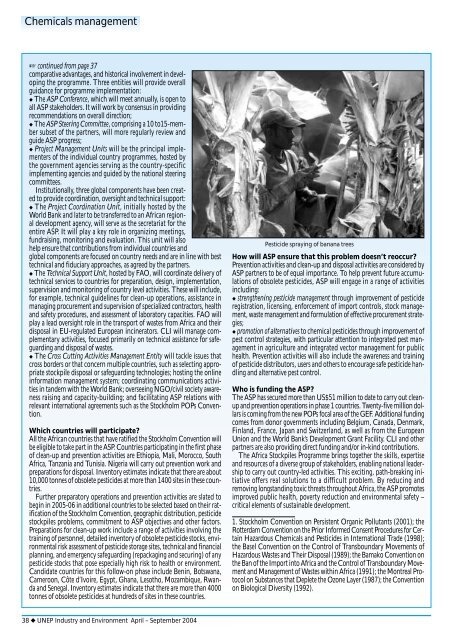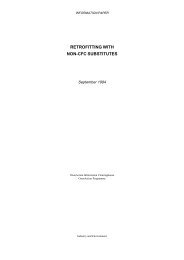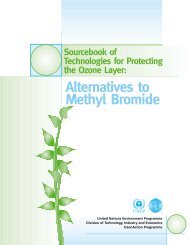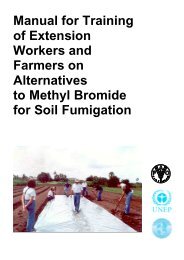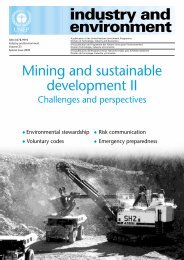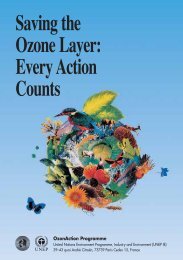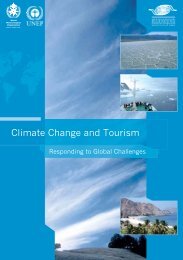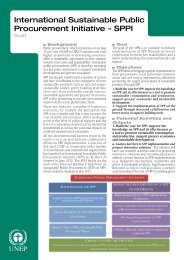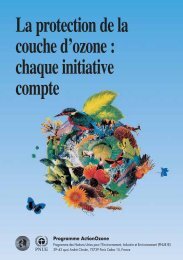industry and environment - DTIE
industry and environment - DTIE
industry and environment - DTIE
You also want an ePaper? Increase the reach of your titles
YUMPU automatically turns print PDFs into web optimized ePapers that Google loves.
Chemicals management<br />
☞ continued from page 37<br />
comparative advantages, <strong>and</strong> historical involvement in developing<br />
the programme. Three entities will provide overall<br />
guidance for programme implementation:<br />
◆ The ASP Conference, which will meet annually, is open to<br />
all ASP stakeholders. It will work by consensus in providing<br />
recommendations on overall direction;<br />
◆ The ASP Steering Committee, comprising a 10 to15-member<br />
subset of the partners, will more regularly review <strong>and</strong><br />
guide ASP progress;<br />
◆ Project Management Units will be the principal implementers<br />
of the individual country programmes, hosted by<br />
the government agencies serving as the country-specific<br />
implementing agencies <strong>and</strong> guided by the national steering<br />
committees.<br />
Institutionally, three global components have been created<br />
to provide coordination, oversight <strong>and</strong> technical support:<br />
◆ The Project Coordination Unit, initially hosted by the<br />
World Bank <strong>and</strong> later to be transferred to an African regional<br />
development agency, will serve as the secretariat for the<br />
entire ASP. It will play a key role in organizing meetings,<br />
fundraising, monitoring <strong>and</strong> evaluation. This unit will also<br />
help ensure that contributions from individual countries <strong>and</strong><br />
global components are focused on country needs <strong>and</strong> are in line with best<br />
technical <strong>and</strong> fiduciary approaches, as agreed by the partners.<br />
◆ The Technical Support Unit, hosted by FAO, will coordinate delivery of<br />
technical services to countries for preparation, design, implementation,<br />
supervision <strong>and</strong> monitoring of country level activities. These will include,<br />
for example, technical guidelines for clean-up operations, assistance in<br />
managing procurement <strong>and</strong> supervision of specialized contractors, health<br />
<strong>and</strong> safety procedures, <strong>and</strong> assessment of laboratory capacities. FAO will<br />
play a lead oversight role in the transport of wastes from Africa <strong>and</strong> their<br />
disposal in EU-regulated European incinerators. CLI will manage complementary<br />
activities, focused primarily on technical assistance for safeguarding<br />
<strong>and</strong> disposal of wastes.<br />
◆ The Cross Cutting Activities Management Entity will tackle issues that<br />
cross borders or that concern multiple countries, such as selecting appropriate<br />
stockpile disposal or safeguarding technologies; hosting the online<br />
information management system; coordinating communications activities<br />
in t<strong>and</strong>em with the World Bank; overseeing NGO/civil society awareness<br />
raising <strong>and</strong> capacity-building; <strong>and</strong> facilitating ASP relations with<br />
relevant international agreements such as the Stockholm POPs Convention.<br />
Which countries will participate?<br />
All the African countries that have ratified the Stockholm Convention will<br />
be eligible to take part in the ASP. Countries participating in the first phase<br />
of clean-up <strong>and</strong> prevention activities are Ethiopia, Mali, Morocco, South<br />
Africa, Tanzania <strong>and</strong> Tunisia. Nigeria will carry out prevention work <strong>and</strong><br />
preparations for disposal. Inventory estimates indicate that there are about<br />
10,000 tonnes of obsolete pesticides at more than 1400 sites in these countries.<br />
Further preparatory operations <strong>and</strong> prevention activities are slated to<br />
begin in 2005-06 in additional countries to be selected based on their ratification<br />
of the Stockholm Convention, geographic distribution, pesticide<br />
stockpiles problems, commitment to ASP objectives <strong>and</strong> other factors.<br />
Preparations for clean-up work include a range of activities involving the<br />
training of personnel, detailed inventory of obsolete pesticide stocks, <strong>environment</strong>al<br />
risk assessment of pesticide storage sites, technical <strong>and</strong> financial<br />
planning, <strong>and</strong> emergency safeguarding (repackaging <strong>and</strong> securing) of any<br />
pesticide stocks that pose especially high risk to health or <strong>environment</strong>.<br />
C<strong>and</strong>idate countries for this follow-on phase include Benin, Botswana,<br />
Cameroon, Côte d’Ivoire, Egypt, Ghana, Lesotho, Mozambique, Rw<strong>and</strong>a<br />
<strong>and</strong> Senegal. Inventory estimates indicate that there are more than 4000<br />
tonnes of obsolete pesticides at hundreds of sites in these countries.<br />
Pesticide spraying of banana trees<br />
How will ASP ensure that this problem doesn’t reoccur?<br />
Prevention activities <strong>and</strong> clean-up <strong>and</strong> disposal activities are considered by<br />
ASP partners to be of equal importance. To help prevent future accumulations<br />
of obsolete pesticides, ASP will engage in a range of activities<br />
including:<br />
◆ strengthening pesticide management through improvement of pesticide<br />
registration, licensing, enforcement of import controls, stock management,<br />
waste management <strong>and</strong> formulation of effective procurement strategies;<br />
◆ promotion of alternatives to chemical pesticides through improvement of<br />
pest control strategies, with particular attention to integrated pest management<br />
in agriculture <strong>and</strong> integrated vector management for public<br />
health. Prevention activities will also include the awareness <strong>and</strong> training<br />
of pesticide distributors, users <strong>and</strong> others to encourage safe pesticide h<strong>and</strong>ling<br />
<strong>and</strong> alternative pest control.<br />
Who is funding the ASP?<br />
The ASP has secured more than US$51 million to date to carry out cleanup<br />
<strong>and</strong> prevention operations in phase 1 countries. Twenty-five million dollars<br />
is coming from the new POPs focal area of the GEF. Additional funding<br />
comes from donor governments including Belgium, Canada, Denmark,<br />
Finl<strong>and</strong>, France, Japan <strong>and</strong> Switzerl<strong>and</strong>, as well as from the European<br />
Union <strong>and</strong> the World Bank’s Development Grant Facility. CLI <strong>and</strong> other<br />
partners are also providing direct funding <strong>and</strong>/or in-kind contributions.<br />
The Africa Stockpiles Programme brings together the skills, expertise<br />
<strong>and</strong> resources of a diverse group of stakeholders, enabling national leadership<br />
to carry out country-led activities. This exciting, path-breaking initiative<br />
offers real solutions to a difficult problem. By reducing <strong>and</strong><br />
removing longst<strong>and</strong>ing toxic threats throughout Africa, the ASP promotes<br />
improved public health, poverty reduction <strong>and</strong> <strong>environment</strong>al safety –<br />
critical elements of sustainable development.<br />
1. Stockholm Convention on Persistent Organic Pollutants (2001); the<br />
Rotterdam Convention on the Prior Informed Consent Procedures for Certain<br />
Hazardous Chemicals <strong>and</strong> Pesticides in International Trade (1998);<br />
the Basel Convention on the Control of Transboundary Movements of<br />
Hazardous Wastes <strong>and</strong> Their Disposal (1989); the Bamako Convention on<br />
the Ban of the Import into Africa <strong>and</strong> the Control of Transboundary Movement<br />
<strong>and</strong> Management of Wastes within Africa (1991); the Montreal Protocol<br />
on Substances that Deplete the Ozone Layer (1987); the Convention<br />
on Biological Diversity (1992).<br />
38 ◆ UNEP Industry <strong>and</strong> Environment April – September 2004


